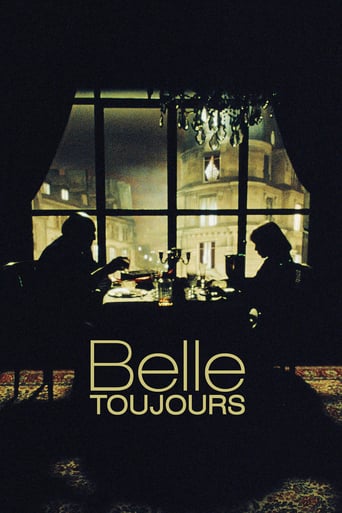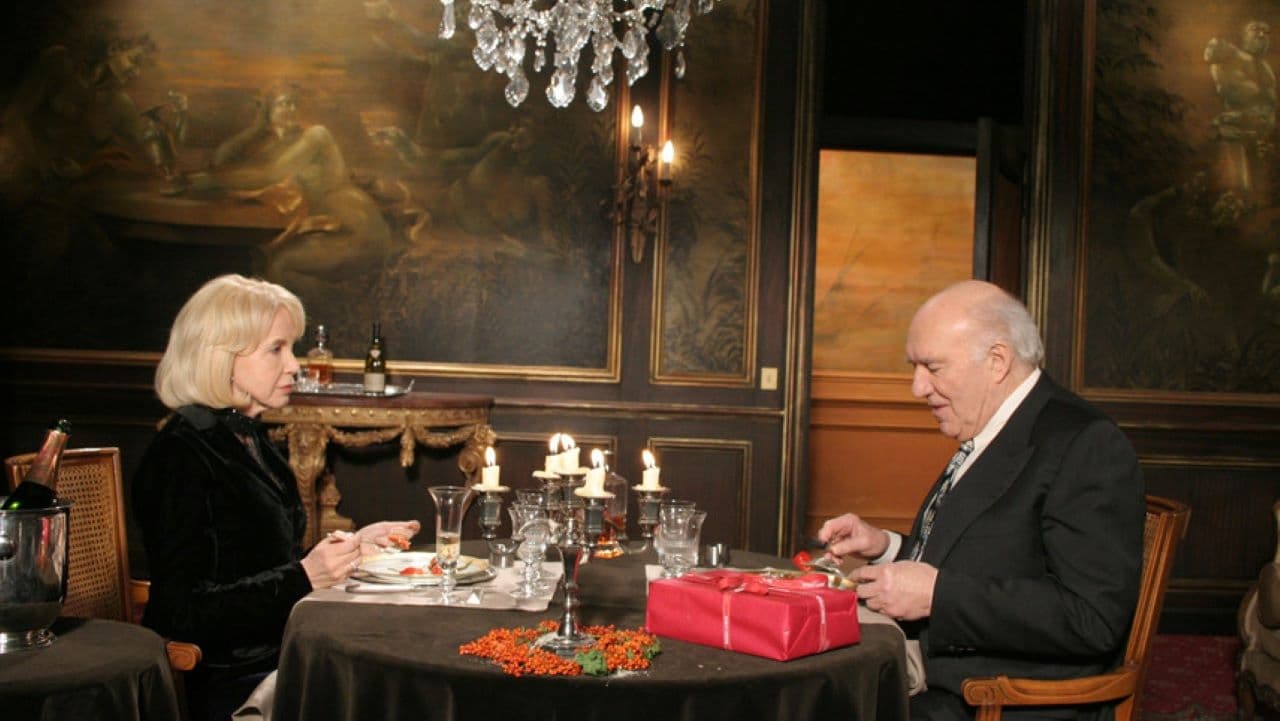Janjira Gardner
First: slow down. Second: turn of the phone. Third: relax. Now you're ready for a treat.
Manoel de Oliveira's Belle Toujours (2006) is a sequel in homage to Belle de Jour (1967), the classic film from Luis Buñuel and Jean-Claude Carrière. Certainly Belle Toujours is diverting and can stand alone; but, when it follows on the heels of Belle de Jour, so that the two films are taken together, then it finds its full stride. Something magical happens. Michel Piccoli returns as "Mr. Husson" (un drôle de type), as Bulle Ogier replaces - who else could? - the otherwise irreplaceable Catherine Deneuve as "Séverine" (la putain-penitent, forty years on). It works very well. Alone, Oliveira's little gem comes in around 60 minutes. If watched immediately after Buñuel's film, the two taken together require 2 hours and 40 minutes. Enjoy. 8/10 plays it safe.
Roland E. Zwick
Running just a little over an hour in length, "Belle Toujours" is Portuguese director Manoel de Oliveira's homage to "Belle De Jour," the classic French film from the 1960s, written and directed by Luis Bunuel. The original featured Catherine Deneuve as a beautiful bored housewife with masochistic fantasies who whiles away her afternoons working as a prostitute in a Paris brothel. In the "sequel," Michel Piccoli returns as Henri Husson, the friend who first suggested the brothel to Severine, and who, all these years later, has decided to have a rendezvous with the woman.Though Piccoli reprises his role from the first movie, Severine is played by a different actress (Bulle Oglier), a casting imbalance that plays havoc with the symmetry of the piece. At least for "A Man and a Woman: Twenty Years Later," yet another misguided attempt at recapturing the magic of an earlier film, both Anouk Aimee and Jean-Louis Trintignant showed up for the reunion - though one can certainly sympathize with Deneuve's reluctance to lend her talents to this film, which is smug, self-indulgent, talky and inert, and does nothing to enhance one's memory of the original work (happily, the utter innocuousness of the film also prevents it from HARMING that memory as well).Henri basically spends the first two-thirds of the movie vainly trying to "connect" with Severine (they keep just missing one another, like in one of those Feydeau bedroom farces), and the last third dining with her in an opulent private room where they talk at length about the past and she tries to convince him that she's a "different" woman from the one he knew before - which should be perfectly obvious to anyone who remembers Catherine Deneuve. Then it all culminates in a fizzle-out ending, and we're left dumbfounded and openmouthed, wondering what the purpose for any of it could possibly have been.One thing, however, is certain: "Belle Toujours" is a complete waste of time and film.
Brakathor
I am fortunate enough to have had the opportunity to view both this film, and the film "Belle Du Jour" upon which it is a sequel, for the very first time in 1 sitting. I was impressed beyond expectation with the first film "Belle Du Jour" directed by Luis Bunuel, only the second film I have seen of his after the very well done "the young one" and am convinced of how great a director he was. That being said, despite the fact that I was very intrigued by the premise of this movie, "Belle Toujours", where 39 years later a sequel was made in which the same characters and one of the original actors meet after so many years to relive their experiences, this movie proved to be everything I feared it would be; a stagey contrived mess filled with pseudo intellectual dribble contained within unrealistic overly dramatized situations, and at best, having no real purpose or unique value of its own.The movie begins with lengthy excerpts in a concert hall which last roughly 8 minutes at which point Henry Husson notices Severine in the audience. You cannot go wrong in opening a film with classical music in this way, though it has been done countless times before. It could have even been very poignant if the two main characters had met outside of the theatre. There are at least three 30 second scenes of shots of Paris with classical music playing, which MIGHT have been poignant if they had first met at the theatre, but which transparently comes across as filler in order for the director to reach an hours length for this waste of film, which only runs 65 minutes long.Instead, Husson did not find Severine outside the theatre, and after wandering the streets aimlessly, he just happened to spot her leaving a bar into a cab, where she just happened to leave the barman with the address of where she was staying. "lucky" as Husson describes it... I would describe it as stagey and poorly conceived, though even here if the director were to spare us from more "luck" the film may have been bearable. Afterwards, Husson goes to the hotel where Severine is staying and just as he enters the elevator she exits the adjacent one, after which he comes down again much too quickly only to see her leave. The hotel clerk then tells him she is leaving the city. Finally, later as he is walking along the street he just happens to bump into her again, where he is talking to her and she walks back and forth, clearly imitating some of the behaviour of Severine Played By Catherine Deneuve in the original film, though to a nauseatingly exaggerated degree. So in the end these 2 re-unite.. after FOUR chance encounters. A Single, might have been poignant. 2 pushy, but 4, utterly ridiculous. This scene which is all shot outside in sky view ends with Husson entering the boutique and emerging 30 seconds later. We later find out that he therein purchased the box with the perverted sex toy held by the oriental client in the first film.... right where he bumps into her for the 4th time; Convenient to a writer and director unable to create a realistic and coherent plot, bust most importantly his character in the first film did not know anything about her encounter with the Asian client.That essentially is the entire plot, not aided at all by the ridiculous fact that in all 3 times the male lead enters the bar where he was able to obtain Severines address, each time there are 2 sex workers there who observe him and interest in his story as if they are fixtures there with no real lives, and nowhere else to be. Almost a third of the movie takes place here, and the worst aspect is that it in no way gives the viewer anticipation for when Husson and Severine finally will speak to each other. Instead it is a reflective and unengaging speculation upon the first movie, which anyone who has seen the first movie could reflect upon as good or better on their own.Finally when the 2 leads meet at a dining room, where they had arranged, after some simple words of exchange, they eat and say nothing to each other for almost 5 minutes. Anyone who finds a single shred of meaning out of this, and doesn't see it as the mindless filler that it is, is the kind of person who would find meaning in a single line drawn on a blank piece of paper. They have a short discussion about the past as the candles on the table 1 by 1 extinguish, a very obvious and somewhat contrived bit of symbolism, until finally they part and the movie is ended by this very empty climax.This entire film is I believe the biggest disgrace upon another movie I have seen. If the plot was at the very least put together in an intelligent and plausible manner, it would at least be acceptable, though still even that disregarded, this film seems like it was put together by a 10 year old with nothing original or new to offer, and literally no plot, based purely on a script contemplating the events in the original movie which could have been written in a couple of hours, and much better done at that. I do not know why Catherine Deneuve did not reprise her role from the first film, but thankfully for her she does not have to associate her name with this absolute disgrace. Michel Picolli should be ashamed of himself for taking part in this pile of film stock. This movie is not even a film of its own. At best it is a meandering reflection upon a true film, and has no purpose to it whatsoever.
jceles
This film by Manoel de Oliveira shows his great knowledge of Buñuel's work but also his admiration of the original Belle de Jour which explains why he would want to return to that story so many years later. My first reaction was that someone who had not seen Belle de Jours would probably not enjoy this. It is in the cinema what Wide Sargasso Sea is in literature, a kind of recreation of a known theme. De Oliveira builds up an amazing tension round what is finally going to happen between the two characters and that makes the meal at the end an example of suspense based not on action so typical of the thriller, but rather on the word, which in Oliveira's films acquires the stature of protagonist. A great movie!


 AD
AD



